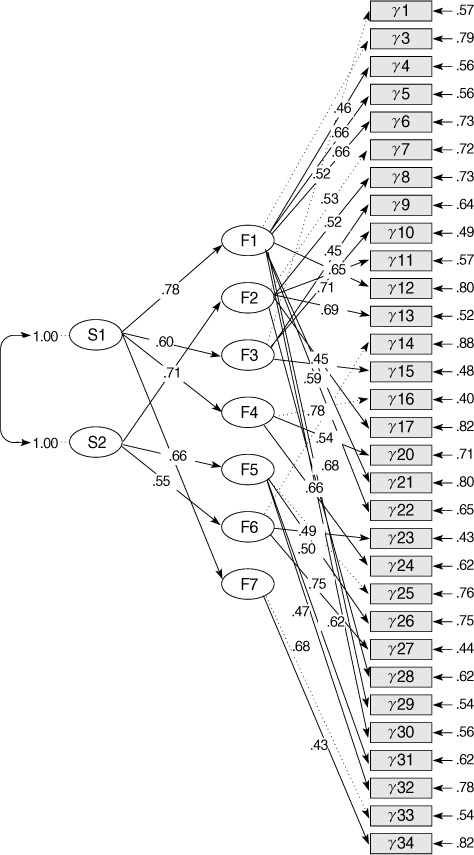J Korean Acad Nurs.
2009 Oct;39(5):700-708. 10.4040/jkan.2009.39.5.700.
Test of Validity and Reliability of the Adolescent Mental Problem Questionnaire for Korean High School Students
- Affiliations
-
- 1College of Nursing, Chonnam National University Chonnam National University Research Institute of Nursing Science, Gwangju, Korea.
- 2Department of Nursing, Chosun University, Gwangju, Korea. yrk@chosun.ac.kr
- 3Department of Statistics, Chonnam National University, Gwangju, Korea.
- 4Psychiatric Mental Health Nurse, Gwangju Namgu Mental Health Center, Gwangju, Korea.
- KMID: 820247
- DOI: http://doi.org/10.4040/jkan.2009.39.5.700
Abstract
- PURPOSE
This study was done to test the validity and reliability of the Adolescent Mental Problem Questionnaire (AMPQ) for Korean high school students.
METHODS
The AMPQ was designed to assess adolescents' mental health status and problem behavior (Ahn, 2006). A methodological study design was used with exploratory factor analysis, Pearson's correlation coefficients, and a fitness of the modified model for validity. Also, Cronbach's alpha coefficients and alternative-form method for reliability were used. AMPQ was tested with a sample of 36,313 high school students. The participants consisted of 18,701 males and 17,612 females.
RESULTS
Seven factors were extracted through factor analysis: 'Psychiatric problems', 'Delinquency', 'Academic troubles', 'Family problems', 'Hazardous behavior', 'Harmful circumstance', 'Eating problems'. These factors explained 51.1% of the total variance. The fitness of the modified model was good (chi-square=38,413.76, Goodness of Fit Index [GFI]=.94, Adjusted Goodness of Fit Index [AGFI]=.93, Comparative Fit Index [CFI]=.95, Root Mean Square Error of Approximation [RMSEA]=.05), and concurrent validity with Korea-Youth Self-Report [K-YSR] was .63. Cronbach's alpha coefficient of the 31 items was .85. CONCLUSION: The results of present study suggest that the modified AMPQ instrument may be useful for efficiently assessing mental health status and problem behavior in late adolescent, high school students.
Keyword
MeSH Terms
Figure
Cited by 2 articles
-
Development of a Korean Risk Behavior Scale for Middle School Adolescents
Hyun Sook Park, Geum Yi Jo
J Korean Acad Psychiatr Ment Health Nurs. 2010;19(2):229-240. doi: 10.12934/jkpmhn.2010.19.2.229.Factors related to Problem Behaviors in High School Girls
Yeon-Hwan Park, Hye-Jin Hyun, Su Jeong Yu, Do-Hwa Byen
J Korean Acad Community Health Nurs. 2011;22(3):315-324. doi: 10.12799/jkachn.2011.22.3.315.
Reference
-
1. Achenbach TM. Manual for the youth self-report and 1991 profile. 1991. Burlington, VT: University of Vermont, Psychiatry Research Center.2. Ahn DH. Development of screening test and auxiliary textbook for adolescent mental health. 2006. Seoul: Korea Ministry of Health and Welfare.3. Bentler P, Bonnett D. Significance tests and goodness of fit in the analysis of covariance structure. Psychological Bulletin. 1980. 88:588–606.4. Browne MW, Cudeck R. Bollen KA, Long JS, editors. Alternative ways of assessing model fit. Testing structural equation models. 1993. Beverly Hills, CA: Sage;136–162.5. Etezadi-Amoli J, Farhoomand AF. A structural model of end user computing satisfaction and user performance. Information and Management. 1996. 30:65–73.6. Fornell C. Issues in the application of covariance structure analysis: A comment. Journal of Consumer Research. 1983. 9:443–448.7. Hayduk LA. Structural equation modeling with LISREL. 1987. Baltimore, MD: Johns Hopkins University Press.8. Hyeon MS, Kim GH, Kim SA. Influencing factors on problem behaviors among adolescents: Focused on middle school students in Seoul. Journal of Korean Academy of Nursing. 2004. 34:252–260.9. Im SB, Oh HY, Park YI, Lee EH, Lee S. Analytical review of resilience for preventive mental health nursing. Journal of Korean Academy of Psychiatric Mental Health Nursing. 2001. 11:304–315.10. Jung SA, Ahn DH, Chung SY, Jeong YG, Kim YY. Development of screening test for adolescent mental health problem behavior. Journal of the Korean Neuropsychiatric Association. 2008. 47:102–112.11. Kim KS. Structural equation model analysis. 2007. Seoul: Hannarae.12. Kim YH, Kim WJ, Park KO, Lee HS, Kim CG. Primary study of developing prevention program for adolescents' deviant behaviors in low income families. The Korean Journal of Home Health. 2000. 38(6):149–169.13. Lee CS, Kweon YR, Kim SJ. The impact of school bullying victim and depression on suicidal ideation of middle school students. Journal of Korean Academy of Psychiatric Mental Health Nursing. 2007. 16:32–40.14. Lee ES. Construction of a structural model about male and female adolescents' alienation, depression, and suicidal thoughts. Journal of Korean Academy of Nursing. 2007. 37:576–585.15. Natvig GK, Albrektsen G, Abderssen N, Ovarnstrorm U. School-related stress and psychosomatic symptoms among school adolescents. Journal of School Health. 1999. 69:362–368.16. Oh KJ, Ha UH, Lee H, Hong KE. K-YSR; Manual for the youth self-report. 2001. Seoul: Gungang-Jucsung Press.17. Pelkonem M, Marttunen M, Aro H. Risk for depression: a 6-year follow up of Finnish adolescents. Journal of Affective Disorder. 2003. 77:41–51.18. Ryu EJ, Choi KS, Seo JS, Nam BW. The relationships of internet addiction, depression, and suicidal ideation in adolescents. Journal of Korean Academy of Nursing. 2004. 34:102–110.19. Torsheim T, Aaoe LE, Wold B. School-related stress, social support, and distress: Prospective analysis of reciprocal and multilevel relationships. Scandinavian Journal of Psychology. 2003. 44:153–159.20. Torsheim T, Wold B. School-related stress, support, and subjective health complaints among early adolescents: Multilevel approach. Journal of Adolescence. 2001. 24:701–713.
- Full Text Links
- Actions
-
Cited
- CITED
-
- Close
- Share
- Similar articles
-
- Development of Screening Test for Adolescent Mental Health and Problem Behavior
- Revision of Adolescent Mental Health and Problem Behavior Screening Questionnaire : Development of Adolescent Mental Health andProblem Behavior Screening Questionnaire-II
- The Development of the Korean Form of Childhoood Attention Problem(CAP) Scale: A Study on the Reliability and Validity
- Validation of Addictive Personality Scale for Screening Adolescents
- Effect of Korean High School Students' Mental Health on Academic Achievement and School Dropout Rate


